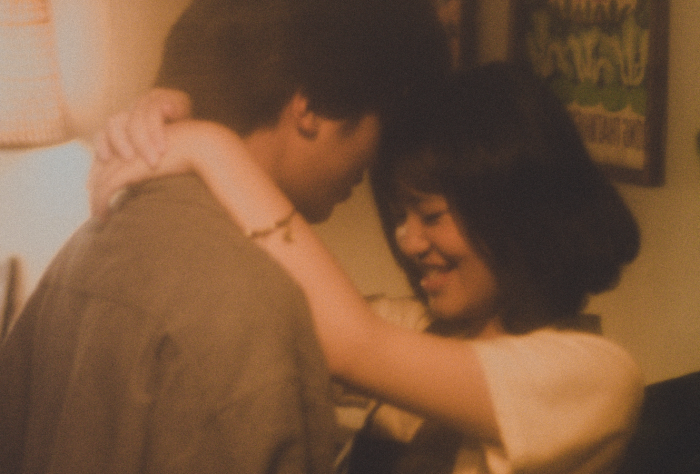Let’s talk about love.
I’ve been thinking an awful lot about love lately.
Especially how we talk about love versus the ways we actually show it, bringing me to ask, “What actually is love?”
I’ve had several experiences in the past month that have put the conversation—and my reflections—about love in the forefront of my mind.
Each one has been a mirror for the larger issues that we all face, and each one has made me feel more deeply committed to a life that not only talks about love but expresses it in all its forms.
The one that is most immediate for me is my recent experience with COVID-19.
I tested positive for Covid on January 4th after feeling kind of out of sorts for a couple of days. Then, I suddenly woke up on that Monday morning and felt absolutely terrible.
Everything hurt—my head, my muscles, my bones. I felt more fatigued than I could ever remember. The sickness took hold quickly and fiercely.
I first lost my sense of smell and taste and then experienced the smell and taste distortions that are worrisome and lonely—enough to drive a person into some dark places.
I slept all the time. I couldn’t eat anything. I worried I would not be able to breathe. I’d lie in bed asking myself, “Is this tightness in my chest?”
“Am I breathing normally?”
“Is it okay to fall asleep?”
No one could visit me, comfort me, keep me company, stroke my hair and tell me it was going to be okay.
While I was never hospitalized, and my case was much less severe than many, it was a pretty dark and lonely place to exist in for almost a month.
And yet, in that place, I learned a lot about love.
One of the days after I had recovered enough to take a slow walk on the beach, I ran into a friend. She asked me, “What did you learn from Covid?”
At that time, I didn’t think that what I had really learned about was love. But I see now that is exactly what it was.
Here’s how:
First, I got to see the difference between saying and doing. I had a lot of people asking me what I needed and telling me they would do anything they could, but then when I told them what I needed or made a request, they never showed up. That didn’t feel like love.
I witnessed many people who opted not to gather in the community at all if they had to wear masks and socially distance because, “If they couldn’t express their love, then why go?”
That didn’t seem like love.
I saw people dig in their heels and share their personal opinions about who gets Covid and why—basically, those who live a healthy lifestyle, who elevate their vibrations and don’t live in fear won’t get it—without ever acknowledging that I was in the room. That I am all of those things, and that I did get it.
That didn’t seem like love.
I read messages from people telling me that if I would just enter into a relationship with Jesus that I would get better. How could they know if I do or don’t have a relationship with Jesus? Those same people never once stopped by my house or asked how they could help.
That sure didn’t seem like love.
It could have been so discouraging. And at times, it was.
But in contrast, I got to see so much of what love actually is—not an obsession with the positive, not me and my comfort and perspective at all costs, not a willful lack of curiosity or self-examination, not using religion as a way to sidestep personal accountability and action.
Instead, love is a willingness to be with people in their darkest moments, without judgment, without advice-giving—or what I like to call the “smugness of health,” without denying their lived experience.
Love is the recognition that suffering is just as much a part of life as joy. To deny one to elevate the other only creates magical thinking that breaks any sense of true connection or of the totality of what life has to offer.
Love is seeing a person for who they are, not for who we are, and offering words of comfort and service based on what makes the most sense for them, not us.
Love is noticing when we are causing harm through unthoughtful words, through the “sin of not bothering,” by noticing that we have backed ourselves into a corner by creating an “us against them” dynamic and remembering that what we really want is to allow another ease and comfort in their suffering. That will never happen when we have blamed, shamed, or put them on the defensive.
Love is letting go of our personal opinions and politics, even if long enough to try to understand another perspective.
Love is doing.
Love is the person who brought me greens every couple of days. Love is the friends who would check in on me multiple times a day, reminding me that I would be okay, sharing their own experiences of Covid, sending me sound baths, and meditations and articles to boost my spirits.
Love is the friend who dropped off a whole bunch of food with a note that said, “If you can’t eat any of this, don’t worry about it. Give it away or throw it away. I won’t be offended; I just wanted you to know I was thinking of you.”
All of this made me think of Bedside Yoga, yoga and end-of-life care, and people who are at the end of life in general.
I had so many toxic wellness people talking to me about how love heals, but not actually having any idea of how to apply that medicine or even check if their “love” medicine was effective, or even if it was love at all. Meanwhile, I also said, so many times, “Love is the one thing that I need the most,” when people asked me genuinely how to help.
In Bedside Yoga, it’s the same. We start with love. Real love. Love that expresses itself through a radically open, egoless heart and mind, and that translates itself into action. People at the end of life, people who are grieving, do not need advice, opinions, proselytizing, or top-down teaching.
They need the open, spacious love that comes from inner stillness, from a deep desire to connect in the complexity of the human experience. They need people to be real, to be present.
And they need their dishes done. The actions of love must come from quietude, and the quietude of love must express itself in thoughtful, skillful, and often practical action.
Love cannot develop into its fullest expression in an echo chamber. It must be brought out into the light, examined, questioned, transformed, matured through self-reflection, through courageous conversation, through an identified desire to show love as not something that we keep for ourselves, but something that is only as powerful as its ability to translate into collective care.
We don’t show love through an obsession with self, but through the knowledge that our capacity for love—to give and receive love—is enhanced a thousandfold when it is in service to the larger community, the larger human family.
It was within this context of considering love through the lens of my own experience with Covid that I had my first class for my graduate program in Theology.
My heart was so open, and I kept telling people I felt both permeable and gentle. While it was hard to imagine sitting in front of a computer screen for seven hours, I was pleasantly surprised at how quickly the time passed. The course, an introduction to Theology, was a foundational training in some key theological questions.
Talking about the mystery of God, the mystery of faith, I was inspired in both new and not-so-new ways. First, I could feel my own growth in my ability to listen and participate in a solidly Christian conversation and not feel any resistance or judgement.
In fact, I was moved by the depth of devotion of my classmates, by their faith, and the way it was always expressed in tenderness and generosity. It felt so freeing to be with people who—at least in some ways —are quite different than me and to be in a space of curiosity and open-mindedness. Their kindness ignited my heart in love. I didn’t need to be suspicious, cynical, or “right.”
Then, simply the topic of the mystery of faith, the mystery of God, brought me to a familiar and comforting place where mystery, complexity, multidimensionality are not only valued but prized. That making things simple, final, or dualistic is the opposite of love and, in fact, chokes off our capacity for true love.
All of this—my Covid experience, the Bedside Yoga trainings, my Master’s program, the Practicing in the Curve community conversation calls that I have been hosting since last March—reminds me of what is most important in life, in our collective experience, and in our shared desire to create a better future out of the scorched earth of our recent past.
And it is this: that love is the most important thing of all. It is the ground from which all else springs. But that love must express itself through mystery, through complexity, through letting go of ego and attachment to our own tiny perspectives.
That love is all-powerful, but that love must include all of us, that our love must have the directive and intention to heal in ways that require us to give up our own narrow viewpoints, our self-protective cages, our tribalism, and individualism.
That love without action, without curiosity, without allowing for complexity is not love at all.
And that if we really want to heal—ourselves, our communities, our planet—we must be willing to make the effort, to walk the walk, not just talk the talk.
Just as we are told in the Yoga Sutras, we must apply:
>> Tapas—determined hard work
>> Svadhyaya—courageous self-examination
>> Ishvara pranidhana—surrender, letting go, trusting in the larger mystery
As we are told in Matthew 7:14,
“Strait is the gate, narrow is the way, that leads to the kingdom of God.”
As we can learn from someone like Father Greg Boyle, whose entire life is an expression of love:
“Often we strike the high moral distance that separates ‘us’ from ‘them,’ and yet it is God’s dream come true when we recognize that there exists no daylight between us. Serving others is good. It’s a start. But it’s just the hallway that leads to the Grand Ballroom. Kinship—not serving the other, but being one with the other. Jesus was not ‘a man for others’; he was one with them. There is a world of difference in that.”
In each of these words of wisdom, we find the same message. That love is already there. And yet, it takes real work to let it express itself in the most needed ways. Not lip service, not posturing—dedication.
We are love. It is worth it always, and perhaps now more than ever, to commit to that work in the spirit of liberation, not just for ourselves as individuals, but for all living beings everywhere.


 Share on bsky
Share on bsky





Read 4 comments and reply